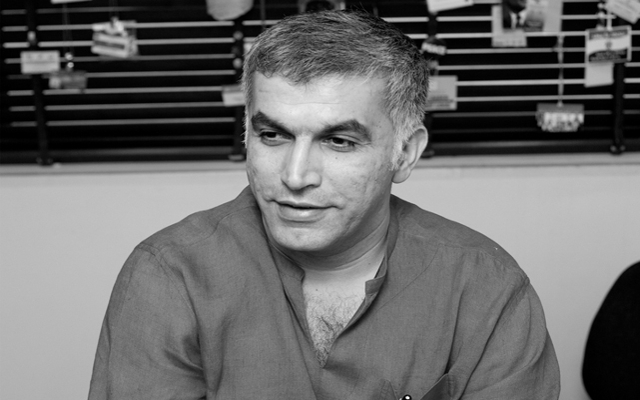On 13 June 2016, Bahraini authorities arrested Nabeel Rajab on grounds that he spread “false news and rumors about the internal situation in a bid to discredit Bahrain.” This arrest is the government’s latest attempt to stifle Rajab’s human rights activism. Despite its multiple attempts to jail Rajab and extinguish his activism, the Government of Bahrain has not been successful.
Over many years of activism, Rajab has demonstrated his passion for bringing human rights to Bahrain. His positive influence has inspired many other activists both in Bahrain and abroad to take up the cause and fight for rights the Bahraini government has been denying its citizens for decades. His presence and influence continues to impact other human rights defenders, and his continual arrests on trumped up charges of expression exemplifies the ongoing need for human rights in Bahrain.
Rajab has spent over fifteen years establishing and managing multiple institutions designed to address the human rights abuses affecting Bahraini citizens and residents. Rajab solidified his role as a human rights defender in 2001, when he co-founded the Bahrain Human Rights Society. In July 2002, Rajab co-founded the Bahrain Center for Human Rights (BCHR) along with other prominent human rights defenders, such as Abdulhadi Al-Khawaja,. Despite a governmental order to dissolve in 2004, the organization still actively promotes civil and human rights in Bahrain. BCHR has remained committed to advocating for Rajab’s vision even during his multiple prison sentences. In 2003, Rajab was a founding member of the Migrant Workers Protection Society, which advocated for the human rights of the thousands of low-paid foreign workers in Bahrain.
Rajab also actively strives for justice in countries other than Bahrain. In April 2011, Rajab and Abdulhadi Al-Khawaja founded the Gulf Center for Human Rights (GCHR), another society striving to make the governments respect and protect human rights. Unlike the previous organizations he founded, GCHR is concerned with cultivating healthy human rights environments in the six Gulf Cooperation Council (GCC) member states as well as Yemen.
Because of his proven record of fighting for human rights, many organizations from around the world have sought Rajab for leadership positions. In October 2009, Coordination of Action Research on AIDS and Mobility (CARAM) Asia elected Rajab Chairperson due to his previous work promoting the rights of migrant workers. In late 2009, Human Rights Watch (HRW) chose him to be a member of the advisory board of the Middle East/North Africa division. He still holds this position. In July 2010, the International Federation for Human Rights (FIDH) appointed Rajab to Deputy Secretary-General. FIDH also appointed him to be their permanent representative in the GCC.
In addition to founding and holding leadership positions in organizations aimed at advancing human rights in Bahrain and around the world, Rajab peacefully advocated for positive government change by taking part in the 2011 Bahrain Pearl Roundabout protests. As a result of his participation in the movement, government authorities beat, arrested, and detained him for exercising his rights to free speech, free assembly, and free expression.
International organizations and charities have recognized Rajab’s positive influence on Bahraini human rights, especially after his involvement in the 2011 protests. In July 2011, the Woodrow Wilson International Center for Scholars presented him with the Ion Ratiu Democracy Award, which aims to recognize individuals working “on behalf of democracy.” In recognizing Rajab, CEO, director, and president of the Wilson Center Jane Harman said of him, “in such a tumultuous year, Nabeel Rajab’s efforts to peacefully advance democratic freedoms for Bahraini citizens, even in the face of considerable personal peril, are truly exemplary.” Later that year, in September 2011, the trustees of the Silbury Fund, a British charity, unanimously voted to award Rajab the Silbury Prize and 1,000 GBP to help “facilitate his on-going humanitarian and human rights work.”
As his stature has grown around the world, Rajab continues to engage with the Bahraini government, urging officials to respect and protect the human, civil, and political rights of its citizens. The Government of Bahrain has arrested and charged Rajab many times in relation to his advocacy. In August 2012, courts sentenced him to three years in prison for protesting against the government’s repression of human rights. After serving two years of the sentence, he was released, and spent two months campaigning in Europe against his treatment and the plight of human rights defenders in Bahrain. Following his return, Bahraini forces arrested him again over tweets critical of the government’s security institutions. The Government of Bahrain has charged Rajab with multiple charges related to his exercise of the right to free speech since 2014. His most recent arrest, on 13 June 2016, is no exception.
Nabeel Rajab’s commitment to ensuring the human rights of others, in- and outside Bahrain, is evident in his actions. Despite the Bahraini government’s multiple attempts to silence his voice, Rajab has had too great an impact on Bahraini citizens and the international community to be effectively muted. His passion for creating safer human rights environments has positively impacted Bahraini citizens and residents. Through his activism, he has created numerous human rights institutions that strive to facilitate universal human rights and been recognized by human rights organizations across the globe. His work has impacted the lives of many individuals, both Bahraini citizens and members of the international community.
Brittany Hamzy is an Advocacy Fellow at ADHRB.





